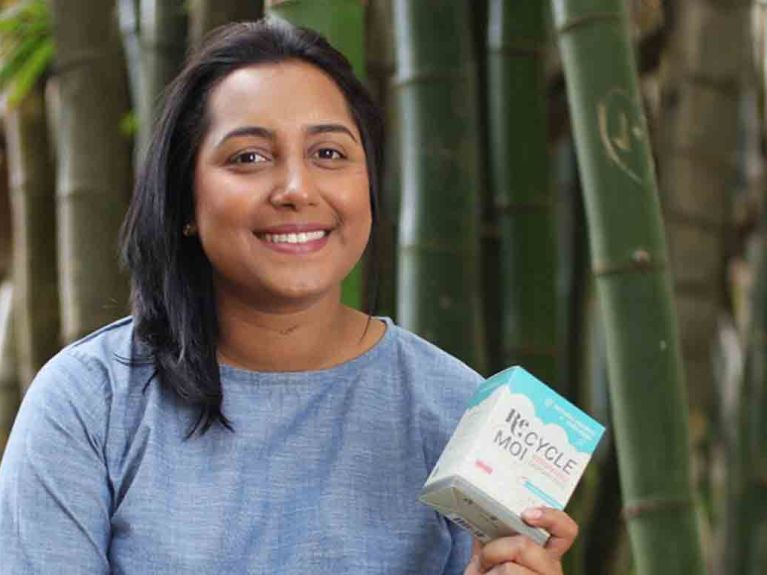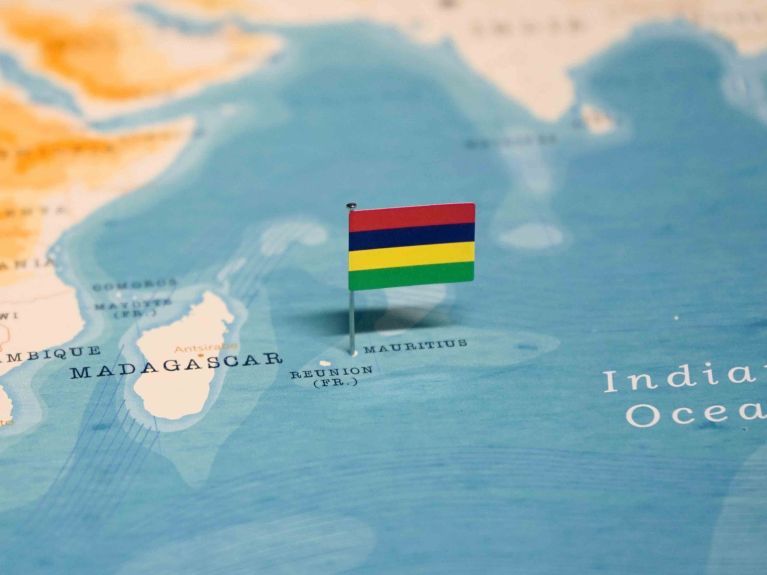More women entrepreneurs for Africa
The EU supports women-owned businesses in Africa. One example is Lalita Junggee from Mauritius with her company Eco Hustle.

“Why am I feeding myself plastic?” asks 34-year-old entrepreneur Lalita Junggee from Mauritius. The African island state east of Madagascar is surrounded by the Indian Ocean. So environmental protection is particularly important for its 1.3 million inhabitants. “It can take 100 to 200 years for the plastic to break down; it can potentially turn into microplastic and end up in the ocean – and the ocean feeds me.” This is where Junggee comes in with her company Eco Hustle, founded in 2019. Under the name “Recycle Moi”, she offers the first biodegradable menstrual pads in Mauritius.

Junggee came up with the idea in 2018. It was then that she became aware of the Women Entrepreneurship for Africa initiative, which GIZ and the Tony Elumelu Foundation are implementing on behalf of the German Federal Ministry for Economic Cooperation and Development (BMZ) and the Organisation of African, Caribbean and Pacific States (OACPS). 2,420 women entrepreneurs have already participated in the programme and have received start-up capital. 100 of them participated in an intensive programme and 30 of these then went on to take part in an additional growth programme – including Eco Hustle. In addition to financial support, the women entrepreneurs receive business coaching and build up contacts within the GIZ network. The programme is part of a European Union initiative under the label Global Gateway. By 2027, a total of 300 billion euros is to be invested in collaborative projects in Africa, Latin America, the Caribbean and Asia.
For the interview, Lalita Junggee joins us from Vancouver in Canada – potentially her company’s first market outside Africa. So far, she has focused on the Southeast African island states: she is already selling her product in the Seychelles and Maldives, and soon also in La Réunion and the Comoros. “As island nations, we all face similar issues, similar problems. And unfortunately there’s one particular issue we have in common, which is the crisis we share in relation to climate change.”
The business has to be profitable and survive on the market, of course. In addition to environmental protection, Junggee is also pursuing a social goal with her company. Her products also seek to combat what is known as “period poverty”: this refers to the worldwide problem that many women do not have access to appropriate hygiene products or cannot afford them. The World Bank reported in 2022 that an estimated 500 million people worldwide do not have access to menstrual products or adequate hygiene facilities. In addition, menstruation is a taboo subject in Mauritius so a lot of women lack health-related information on the topic.
Dieses YouTube-Video kann in einem neuen Tab abgespielt werden
YouTube öffnenThird party content
We use YouTube to embed content that may collect data about your activity. Please review the details and accept the service to see this content.
Open consent formCombating period poverty together
According to a 2022 publication issued by the United Nations Development Programme for Mauritius and Seychelles, a number of campaigns, initiatives and products have helped improve the situation – including Eco Hustle sanitary pads, which are not only more ecofriendly but also cheaper than the conventional alternatives. The problem still exists, however, as Junggee says: “There’s definitely room for more suppliers here and I hope my business inspires others to get involved.” The social taboo is being broken down, too, thanks in part to Junggee’s entrepreneurial activism in the small country. “I’m definitely proud that I’ve initiated a debate here about menstruation and that men are participating in that debate, too.”
Africa is home to some of the world’s fastest growing economies. Women make up more than half of the population, but they only contribute one third of the continental gross domestic product. There is enormous economic potential here. The African Development Bank (AfDB) has stated that women-led start-ups play a key role in economic development on the continent. A review of several studies by Harvard University shows that increasing the share of women-owned businesses in Africa is conducive to growth.
Dieses YouTube-Video kann in einem neuen Tab abgespielt werden
YouTube öffnenThird party content
We use YouTube to embed content that may collect data about your activity. Please review the details and accept the service to see this content.
Open consent formThis is where the support programme “Women Entrepreneurship for Africa” comes in. Eco Hustle has now successfully completed this programme, establishing a network that will remain in place for the future. “It’s like a lifetime subscription.” In future, Junggee plans to move the production of her sanitary pads entirely to Africa. She currently imports bamboo fibre from India. The company is testing whether banana fibres and water hyacinth – plants that grow in abundance on Mauritius – are suitable substitutes for the production of sanitary pads. Junggee’s long-term goal is to establish herself on the African continent. “Africa is the place I connect with most because it’s my home. And Africa has the necessary resources, too. It has problems, but it also has the solutions. We just need to get together with the right individuals and get the right people on board. And that’s exactly what’s happening with the ‘Women Entrepreneurship for Africa’ initiative.”




